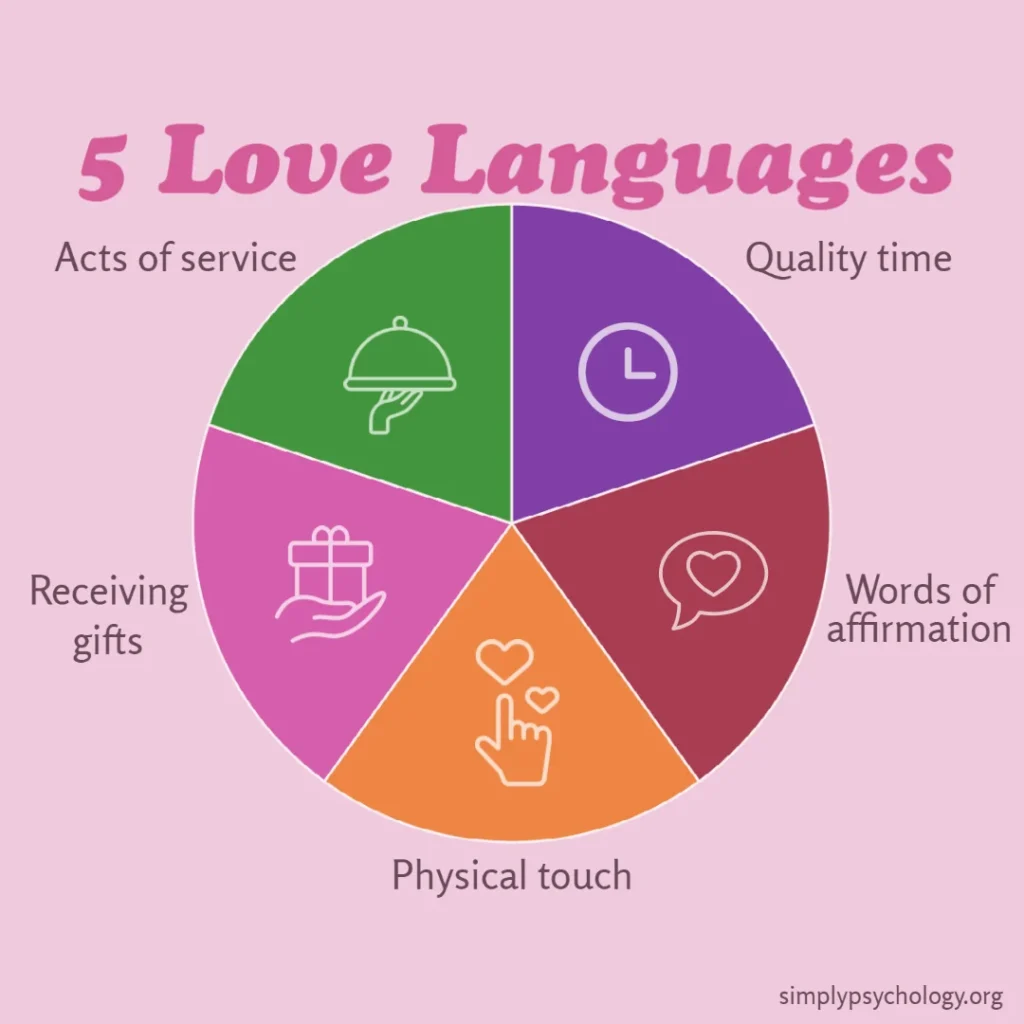Introduction:
In the symphony of relationships, understanding the nuances of love languages can be the key to creating a harmonious and deeply connected bond. Love languages, those tender expressions of affection that resonate uniquely with each individual, play a crucial role in the intricate dance of love. Today, we embark on a heartfelt exploration into the realm of love languages, discovering how a simple questionnaire can be the lantern guiding us through the maze of emotions.
As defined by renowned relationship expert Dr. Gary Chapman, love languages encompass Words of Affirmation, Quality Time, Physical Touch, Acts of Service, and Gifts. Each language is a dialect of love, a code waiting to be deciphered to unlock the depths of emotional connection.
Why are Love Languages Important?
Knowing your and your partner’s love language can help you improve your communication and relationship. By understanding how each of you prefers to give and receive love, you can avoid misunderstandings, reduce conflicts, and increase intimacy. You can also learn to appreciate the different ways your partner shows love, and express your love in ways your partner will appreciate.

How to Discover Your Love Language with a Questionnaire
One of the easiest ways to find out your love language is to take a questionnaire. There are many online quizzes that you can take for free, such as The Love Language® Quiz, Love Languages Assessment, or Love Language Test. These quizzes usually ask you to rate the importance of various statements or scenarios, such as “I feel loved when my partner compliments me” or “I like to spend quality time with my partner”. Based on your answers, the quiz will tell you which love language is your primary one, and what it means.
Alternatively, you can also create your questionnaire by asking yourself some questions, such as:
- How do I usually show love to others?
- How do I like to be loved by others?
- What makes me feel most loved and appreciated?
- What makes me feel hurt or neglected?
- What are some examples of things that my partner does or says that make me feel loved?
- What are some examples of things that I do or say that make my partner feel loved?
By answering these questions, you can get a sense of what your love language is, and how it differs from your partner’s.

Five Love Languages Test
Words of Affirmation:
Like a gentle breeze caressing the soul, words of affirmation have the power to uplift and reassure. Simple expressions of love, compliments, and verbal appreciation speak volumes to those fluent in this language. Telling your partner how much they mean to you or expressing gratitude becomes the sweet melody that serenades their heart.
Quality Time:
In the chaotic rush of life, the gift of undivided attention becomes a precious jewel. Quality time, the language of shared moments, speaks to the heart in a language of its own. Whether it’s a quiet dinner, a weekend getaway, or a simple walk hand in hand, the essence lies in the undistracted togetherness that fuels the flames of love.
Physical Touch:
For some, love is best conveyed through the language of touch. A tender embrace, a reassuring pat on the back, or a passionate kiss – physical touch serves as the bridge connecting hearts. It’s a silent conversation where emotions flow seamlessly through the language of skin-to-skin connection.
Acts of Service:
They say that actions speak louder than words. In the world of love languages, acts of service are the unspoken declarations of devotion. From lending a helping hand with daily chores to going the extra mile to make life easier, these gestures resonate deeply with those who find solace in deeds rather than declarations.
Gifts:
In the art of love, the language of gifts is a canvas painted with thoughtfulness and consideration. The sentiment behind the gift is more important than the price. A carefully chosen token, whether big or small, becomes a tangible manifestation of love, a symbol that transcends words.
To uncover your primary love language, embark on a journey of self-discovery with a reputable online love language quiz, such as The Love Language® Quiz. Answer thoughtfully, and let the revelations unfold.
Interpreting the results is the gateway to a richer, more nuanced understanding of yourself and your partner. Armed with this knowledge, communication becomes a dance where partners effortlessly glide in sync, knowing exactly how to express love and receive it.

How to Use Your Love Language to Strong Your Relationship
Once you know your love language and your partner’s, you can use this information to enhance your relationship. Here are some suggestions on how to do that:
- Express your love in your partner’s love language. For example, if your partner’s love language is words of affirmation, you can complement them, thank them, or write them a love note. If their love language is physical touch, you can hug them, kiss them, or hold their hand.
- Ask for what you need in your love language. For example, if your love language is quality time, you can ask your partner to spend some uninterrupted time with you or plan a date night. If your love language is acts of service, you can ask your partner to help you with a chore or do something nice for you.
- Appreciate the love that your partner shows you in their love language. For example, if your partner’s love language is gifts, you can thank them for the thoughtful present, or display it somewhere visible. If their love language is acts of service, you can acknowledge the effort they put into helping you, or praise them for their skills.
- Learn more about your partner’s love language. For example, you can ask them what kind of words, actions, or gifts make them feel most loved, or what they would like you to do more or less of. You can also read more about the different love languages, or take the quizzes together.
How to fall in love in 10 questions?
There is no definitive answer to this question, as different people may have different ways of falling in love. However, some researchers have suggested that asking and answering certain questions can help create a sense of intimacy and connection between two people, which may lead to love. Colleagues. These questions are designed to gradually increase the level of self-disclosure and vulnerability between the participants, as well as to elicit positive feedback and validation. The questions are divided into three sets, each more personal and probing than the previous one.
If you want to try a shorter version of this exercise, you can use the following 10 questions, which are adapted from the original 36 questions. These questions are not guaranteed to make you fall in love, but they may help you learn more about your partner and yourself, and spark some interesting and meaningful conversations.
- What are you most passionate about in life?
- What are you most afraid of?
- What are you most proud of?
- What are you most curious about?
- What are you most grateful for?
- What qualities are you most looking for in a partner?
- What are you most willing to compromise on in a relationship?
- What are you most curious about for the future?
- What are you most sorry about in the past?
- What are you most in love with right now?
To make the most of this exercise, you should answer the questions honestly and openly, and listen attentively and empathetically to your partner’s answers. You should also avoid judging, criticizing, or interrupting your partner, and instead express interest, appreciation, and support. You can also ask follow-up questions or share your own experiences to deepen the conversation. After answering the 10 questions, you can also try staring into each other’s eyes for four minutes, which is another part of Aron’s experiment.
Conclusion
Love languages are a useful tool to understand yourself and your partner better, and to improve your communication and relationship. By taking a simple questionnaire, you can discover your primary love language, and learn how to express and receive love in the most effective way. You can also use your love language to show appreciation, ask for what you need, and avoid misunderstandings. By speaking your partner’s love language, and listening to theirs, you can create a stronger bond and a happier relationship.
FAQs:
Q: What is the best way to take the love language quiz?
A: The best way to take the love language quiz is to answer the questions honestly and spontaneously, without overthinking or second-guessing your choices. You can take the quiz online, or print it out and fill it in by hand. You can also take the quiz with your partner, and compare your results.
Q: How can I apply the love language concept to other relationships, such as family, friends, or coworkers?
A: The love language concept can be applied to any relationship where you want to improve your communication and understanding. You can use the same questionnaire to find out the love language of your family members, friends, or coworkers, or ask them directly what makes them feel appreciated. You can then use their love language to show them respect, gratitude, or support.
Q: How often should I take the love language quiz?
A: There is no fixed rule on how often you should take the love language quiz, but it is recommended to take it at least once a year, or whenever you feel a change in your preferences or needs. Your love language may change over time, depending on your life circumstances, experiences, or personal growth. Taking the quiz regularly can help you stay in tune with yourself and your partner.
Q: What happens if my partner and I have different love languages?
A: Having different love languages is not a problem, as long as you are willing to learn and speak each other’s language. You can use the quiz results as a guide to understand how your partner feels loved, and what you can do to meet their needs. You can also ask your partner for feedback, and express your own needs in your love language.